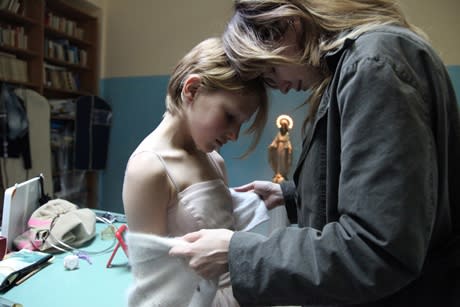Before experiencing Alice Rohrwacher's acutely observed, grounded and realist feature film debut, Corpo Celeste, it's important to note the cover art on the DVD. Typically, cover art promotes a film by showing off actors or highlighting the most marketable aspect of the film, even when it's as crass as denoting the résumé of the producer. Corpo Celeste features a young, blindfolded girl looking up to the sky with only a white, patterned backdrop surrounding her. Encapsulating the essence of the film perfectly, it sets up themes of religious hypocrisy and blind assimilation and guidance during the formative years. Even geographically, this is relevant, since this simple and engrossing work follows young Marta (Yle Vianello) prior to undergoing the rite of confirmation after moving to Italy from Switzerland. Initially indifferent and mildly amused by the indoctrination process of the Catholic church and their ideological simplification tactics (telling children that any doubt, pain or confusion they have can be remedied by thinking of Jesus), Marta's perspective changes as she quietly witnesses the moral rigidity and hypocrisy of those in positions of religious authority. In telling this story, Rohrwacher is careful to pay attention to perspective, acknowledging that the church system is ostensibly a business, operating in a moneymaking, promotional capacity, but focusing more so on Marta's coming-of-age experience as a young woman being forced into a set of beliefs and behaviours that ignore her genuine concerns. Dealing with her first period and responding with sincere confusion to a system that advertises universal love, despite being intolerant of difference and openly lying to children, she takes bold steps towards distinguishing her identity and confronting the conflicting logic presented to her. Without forcing any unlikely character arcs or heavy-handed speeches, Rohrwacher has deconstructed an institution through the eyes of a child believably and intelligently. And since this is a Film Movement release, the DVD includes a short film. Directed by Max Zahle, Raju tells the story of a German couple that learn the Indian boy they adopted from an orphanage was actually kidnapped by activists for a chance at a "better life" in another country. It's quite polished and professional, revealing a filmmaker to keep an eye on.
(Film Movement)Corpo Celeste
Alice Rohrwacher

BY Robert BellPublished Nov 15, 2012



